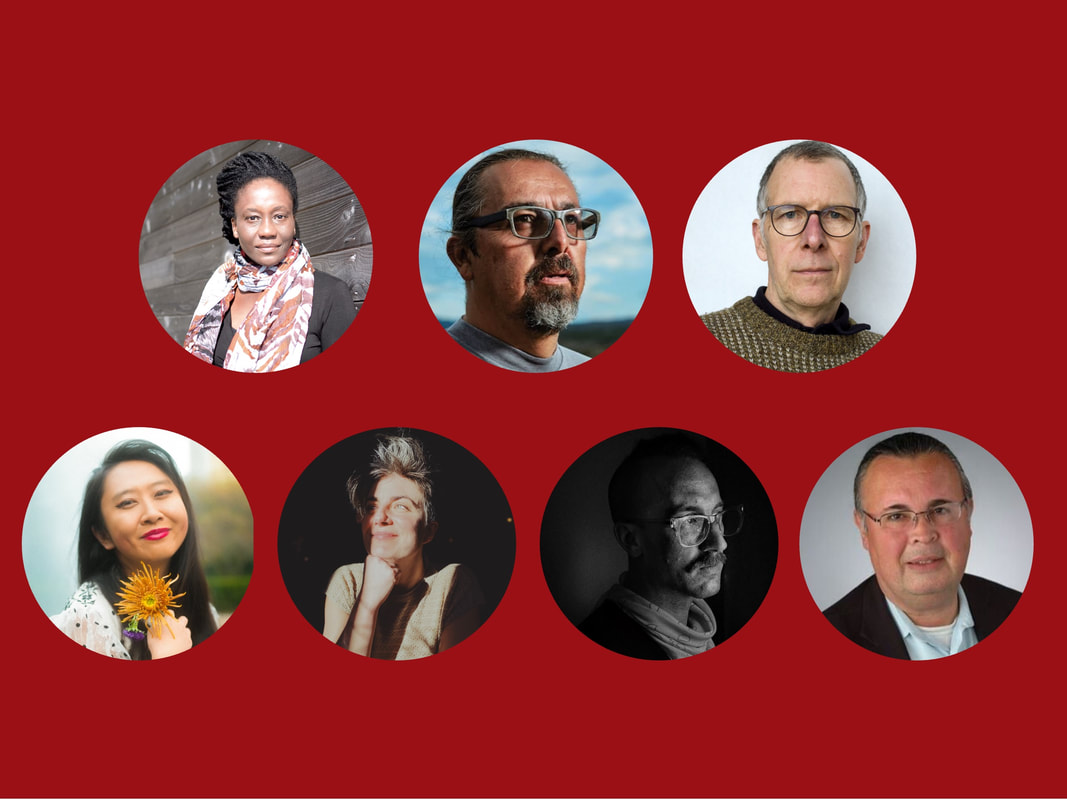|
Ucross is hosting its second annual Founder's Day event on Saturday, June 3, from 11 a.m. to 2 p.m.
The community is invited to tour the artist residency campus, visit the artists in their studios, explore the Ucross Art Gallery, enjoy a picnic on the lawn and celebrate the program’s 40th Anniversary. Free tickets are available here. Seven artists-in-residence are opening their studios to the public. Before you meet them, get to know each Ucross Fellow, featured in header image, from left: Catina Bacote, Nonfiction; Hamden, CT Originally from New Haven, Connecticut, Catina Bacote is a nonfiction writer. In 2021, her work earned her a Jerome Hill Artist Fellowship and an American Association of University Women Fellowship. Her essays have appeared in the anthology This Is the Place: Women Writing About Home, Ploughshares, Tin House, The Gettysburg Review, Kweli, The Offing, December Magazine, TriQuarterly, Prairie Schooner, Gulf Coast, The Common, The Southern California Review, and elsewhere. Her criticism, “The Funk of Defiance, The Freedom of Refusal,” will appear in the second edition of Bending Genre: Essays on Creative Nonfiction. She has presented at conferences and colleges throughout the country including The University of Chicago, The New School, Yale University, and Washington State University. Her work has been supported by residencies at Hedgebrook, Headlands Center for the Arts, The Millay Colony, Willapa Bay AiR, the Djerassi Resident Artist Program, Brush Creek Foundation for the Arts, MacDowell, and Ragdale, where she received the Alice Judson Hayes Social Justice Fellowship. Bacote holds an MA from Teachers College, Columbia University, and an MFA from the University of Iowa, where she was a Dean’s Fellow and subsequently served as the Provost’s Visiting Writer in Nonfiction. She is an Assistant Professor of creative writing at Trinity College and working on her first book project, which chronicles the lasting impact of the illegal drug trade on families and communities. Gerald Clarke, Visual Art; Anza, CA; Ucross Fellowship for Native American Visual Artists Gerald Clarke grew up on a reservation cattle ranch. Clarke’s family had no money for toys, and he learned at a very early age to be creative and make things for himself. The elementary school Clarke attended was progressive in terms of arts education, and he excelled in the arts. He received several awards in elementary school for his class art projects. Clarke’s ability to “build” and “fix” was translated into efforts in drawing, printmaking, sculpture, etc. Before graduation from high school, Clarke was told he was not “college material” by the guidance counselor. Eventually, he decided to give college a try. He decided to major in art because of his passion for making things, but also felt like he had a unique perspective that he wanted to share with others. After receiving a BA in art, Clarke went on to graduate school and earned MA/MFA degrees in painting and sculpture. Culturally, Clarke was raised with an understanding of the importance of family and community. Even at a young age, he appreciated the wide-open spaces of the reservation to wander, play and participate in the tribe’s cultural activities. While many contemporary artists stress the importance of self-expression, Clarke felt the weight of the responsibility owed to his ancestors. He believes self-expression is as natural as breathing and he does not focus on it at all. Instead, Clarke focuses on trying to make art that is honest to the life he has led as a contemporary Native person. Michael Kolster, Visual Art; Brunswick, Maine Michael Kolster was born in 1963 in Milwaukee, Wisconsin, and grew up in Rochester, New York. He earned his BA in American studies at Williams College, his MFA at the Massachusetts College of Art, and a certificate from the full-time Documentary Photography program at the International Center of Photography in New York City. Currently, he is Professor of Art at Bowdoin College, where in 2008, he received the Sydney B. Karofsky Prize for Junior Faculty in recognition of his teaching. In 2013, he was awarded a John Simon Guggenheim Memorial Foundation Fellowship in Photography. His work is included in the permanent collections of the American University of Paris, Center for Creative Photography, Eastman Museum, High Museum of Art, Museum of Contemporary Photography, and Princeton University, among others. He has exhibited nationally and internationally, including solo exhibitions at the Telfair Museums in Savannah, Georgia; American University of Paris; Bowdoin College Museum of Art; Page Bond Gallery in Richmond, Virginia; and Schroeder Romero and Shredder in New York City. His first book, Take Me to the River (George F. Thompson Publishing, 2016), which examined four Atlantic rivers 40 years after the Clean Water Act, was nominated for the Aperture First Book Award. His second book, L.A. River (George F. Thompson Publishing, 2019), explores the ongoing channelization of the river running through America’s second-largest city. Kolster lives in Brunswick, Maine, with his wife, Christy Shake, son Calvin, and Nellie, their goldendoodle Sally Wen Mao, Poetry; New York, New York Sally Wen Mao is the author of the fiction collection NINETAILS (Penguin Books) and the poetry collection The Kingdom of Surfaces (Graywolf Press). She is also the author of two previous poetry collections, Oculus (Graywolf Press, 2019), a finalist for the Los Angeles Times Book Prize, and Mad Honey Symposium (Alice James Books, 2014). The recipient of two Pushcart Prizes and a National Endowment for the Arts fellowship, she was recently a Cullman Fellow at the New York Public Library and a Shearing Fellow at the Black Mountain Institute. Her poetry and prose have appeared in The Best American Poetry (2021 and 2013), The Paris Review, Poetry, Harper’s Bazaar, A Public Space, Granta, The Kenyon Review, The Georgia Review, Guernica, among others. She currently lives in New York City and is at work on her debut novel, which will be coming out from Viking Books. Annie Saunders, Multidiscipline/Performance; Los Angeles, California; Ucross Partnership with the UCLA Center for the Art of Performance Annie Saunders is a multidisciplinary creator and director of site-specific experiences, and she has created award-winning multi-platform projects for major arts institutions including the Public Theater, The Los Angeles Philharmonic, the Broad Stage, and Summerhall, as well as site-specific projects in disused spaces set for demolition and experiential campaigns for multinational brands. Her site-specific audio piece CURRENT won the Tribeca Film Festival's Best Immersive Creative Nonfiction and the Tribeca X Award in 2021, and her large scale installation The Home, a headphone-based experience for one audience member at a time for Domestic Violence Awareness Month, received an Honorary Mention in Sound Art from Ars Electronica, won the D&AD Yellow Pencil (Creative Excellence for Spatial Design and Installation Design) and APA Ideas Awards in the UK for Best Experiential Project and Best Use of Technology for Good. The work is in archives in the Department of Film at MOMA NYC. She is a member of the inaugural ONX Studio, an invited accelerator for artists working in extended reality to develop significant works for the public realm through NEW INC (the New Museum) and an alumnus of the Devised Theater Working Group for next-generation performance-makers at the Public Theater. Saunders is the founder and artistic director of site-specific performance company Wilderness, and her experimental project The Wreck for Opera Omaha was called “ingenious...a persuasive expression of complex female feeling,” by the Wall Street Journal. Andrew Schneider, Interdisciplinary; Brooklyn, New York; Ucross Partnership with the UCLA Center for the Art of Performance Andrew Schneider is mostly interested in how humans telling stories about ourselves to each other can make us better at being humans. and how much the second law of thermos dynamics and grief have in common. He is an OBIE award-winning, Drama Desk-nominated performer, writer, and interactive-electronics artist creating original works for theater, dance, sound, video, and installation since 2003. Right before the pandemic, Andrew premiered the choreographic work »remains« commissioned by the Sasha Waltz & Guests company at Radial system in Berlin, Germany. During the pandemic he began work on a narrative, immersive installation set to premiere in NYC in 2023. The in-development title is NOWISWHENWEARE. Original performance work in NYC includes (2018, BAM Next Wave); AFTER (2018, Under the Radar, The Public Theater); YOUARENOWHERE (2015 OBIE award, 2016 Drama Desk nom); DANCE/FIELD (2014, Roulette); TIDAL (2013, River to River); and WOW+FLUTTER (2010, The Chocolate Factory Theater), among others. Schneider has been a recurring collaborator with The TEAM, Lars Jan / Early Morning Opera, Annie Saunders, David Dorfman Dance, Hotel Savant, and Fischerspooner. He was a 2019 Visiting Fellow in Theater Arts and Performance Studies at Brown University. He is a recipient of the Foundation for Contemporary Arts “Grants to Artists” award (2020), is currently a Sundance “Art of the Practice” Fellow, and has received a fellowship from the Junge Akademie / Akademie Der Künste in Berlin (2022). He teaches a recurring class on original-flavor reality at the Interactive Telecommunications Program at NYU. Off-Broadway credits upon request. Scott Manning Stevens, Nonfiction; Syracuse, New York Ucross Trustee Scott Manning Stevens is a citizen of the Akwesasne Mohawk Nation and earned his PhD in English from Harvard University. Dr. Stevens was the former Director of the D’Arcy McNickle Center for American Indian and Indigenous Studies at the Newberry Library in Chicago. He is currently the Director of the Native American Indigenous Studies Program at Syracuse University. There he also teaches courses in the departments of English and Art History. During the academic year 2021-2022, he was a fellow at the Harvard Radcliffe Institute for Advanced Study. Stevens is the co-author of two books on Native American history and visual culture, Home Front: Daily Life in the Civil War North (U Chicago 2013) and Art of the American West (Yale UP, 2014). Dr. Stevens is also a co-editor and contributor to the 2015 collection of essays Why You Can't Teach United States History without American Indians. His recent book chapters and articles include: “From ‘Iroquois Cruelty’ to the Mohawk Warrior Society: Stereotyping and the Strategic Uses of a Reputation for Violence,” Violence and Indigenous Communities: Confronting the Past, Engaging the Present (Northwestern UP, 2021) and “On Native American Erasure in the Classroom,” Teaching Race in Perilous Times (SUNY Press, 2021). Stevens also serves or has served on advisory committees at the National Museum of the American Indian, the Smithsonian American Art Museum, and the New York Historical Society. He has held fellowships from the Mellon Foundation, the Ford Foundation, and the National Endowment of the Humanities. LEARN MORE ABOUT UCROSS FOUNDER'S DAY HERE. Comments are closed.
|
UCROSS FOUNDATION
|
|



 RSS Feed
RSS Feed